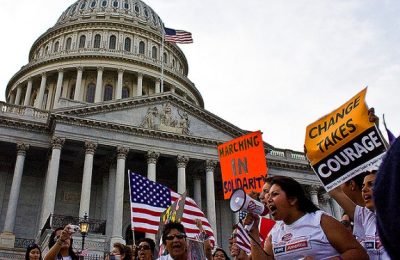Legislation

Immigration Tops Economy as Most Important Issue for Latino Voters
According to a poll released yesterday, “U.S. immigration policy” beat out “economy and jobs” as the issue most important for Hispanic voters. The poll, conducted by independent research firm Latino Decisions, asked 500 registered Hispanic voters to name the most important issues facing Hispanics. 51% of respondents said “immigration;” 35% said “economy and jobs;” and 15% said “education.” Pollsters suggest voters’ “direct and personal connection with the problems of the undocumented” as a reason immigration topped the economy—personal relationships that even “affect the political choices of a second or third generation of Latinos born here.” With reform efforts stalled in Congress, many are wondering what kind of political choices Hispanic voters will make in the upcoming 2012 election cycle. Read More

Once Again, Congress Pursues Costly E-Verify Legislation to the Peril of U.S. Economy
Washington D.C. – On Wednesday, the House Judiciary Subcommittee on Immigration Policy and Enforcement will hold a hearing on the “Legal Workforce Act,” another enforcement-only bill introduced today by Judiciary Chairman Lamar Smith (R-TX). The bill would make the electronic employment verification system “E-Verify” mandatory for all employers within two… Read More

Alabama Governor Signs Costly Immigration Bill, ACLU to File Suit
Yesterday, Alabama Governor Robert Bentley signed a restrictive immigration bill (HB 56) into law, making Alabama the fourth state to sign “get tough” Arizona-style immigration legislation. Among the restrictive provisions, HB 56 requires local law enforcement, in some instances, to verify the immigration status of those stopped for traffic violations, public schools to determine the immigration status of students, employers to use E-Verify and makes it a crime to knowingly rent to, transport or harbor undocumented immigrants. Although Gov. Bentley touts the law as the nation’s toughest, he might also consider mounting a similarly tough legal defense as civil rights groups have declared their intention to file suit. Read More

Why Making E-Verify Mandatory Doesn’t Solve Anything
As the national debate over E-Verify continues to heat up, some members of Congress seem intent on pushing for mass deportation strategies without taking into account the harm they will cause for American businesses and workers, and without acknowledging that making E-Verify mandatory will not resolve any underlying problems. Read More

Alabama Passes “Get Tough” Immigration Enforcement Law
Like Arizona, Utah and Georgia before it, Alabama became the fourth state to pass Arizona-style immigration enforcement legislation—legislation that in some aspects goes beyond Arizona’s immigration law. Last week, Alabama’s Republican-controlled House and Senate passed HB 56, a bill which, among other things, authorizes local police to inquire about the immigration status of anyone they “reasonably suspect” is not authorized to be in the country during a stop. Who is “reasonably suspicious?” Apparently those without driver’s licenses, those who “act nervously,” and those whose vehicle tags don’t match registration records. Read More

States that Passed Arizona-style Immigration Laws Now Face Costly, Uphill Legal Battles
Despite repeated warnings from business groups, tourism and industry boards and advocates about the hefty price tag attached to Arizona-style legislation, state lawmakers continued to push “get tough” copycat proposals. Many ultimately rejected SB1070-style legislation (26, to date) due to high costs and political backlash, while others severely watered down, altered or put on hold legislation targeting undocumented immigrants. But states that did pass anti-immigrant legislation, like Georgia and Indiana, now face costly, uphill legal battles. Read More

Hill Update: House Considers Immigration Amendments in Appropriations Bill
This week, the House of Representatives is considering the Homeland Security Appropriations Bill, H.R 2017—which is, of course, a golden opportunity for lawmakers to attempt to tack on immigration amendments. As of today, 19 immigration and border related amendments were filed. The House agreed to eight of the amendments and rejected two. Read More

Senators Introduce Military Families Act
The week before the Memorial Day holiday, several senators honored U.S. military families caught up in our broken immigration system by introducing The Military Families Act. Senators Robert Menendez (D-NJ), Harry Reid (D-NV), Richard Durbin (D-IL), Charles Schumer (D-NY), Patrick Leahy (D-VT), Daniel Akaka (D-HI), Michael Bennet (D-CO), and Kirsten Gillibrand (D-NY) introduced the bill. Read More

More States Toss Costly Immigration Legislation in Final Days of Session
As many state legislative session wrap up for the year, more lawmakers are jumping ship on controversial enforcement measures targeting undocumented immigrants. Whether they are under pressure from business groups, conflicted over the bills’ substance, or realize that these measures will cost their state millions in legal challenges, implementation expenses and tourism revenue, lawmakers are not finding the same appetite for “get tough” enforcement legislation as they did last year. Read More

Immigration Court Backlog Likely to Get Worse Before It Gets Better
Our nation’s immigration courts are backlogged. Historically backlogged. At the end of last year, more than 260,000 cases remained pending before immigration judges. Across the country, the average wait was nearly sixteen months. In California, thousands of cases have been pending for more than two years. While justice is not always swift, our immigration courts are getting increasingly further from the finish line. Read More
Make a contribution
Make a direct impact on the lives of immigrants.
